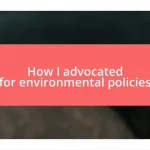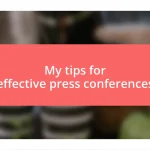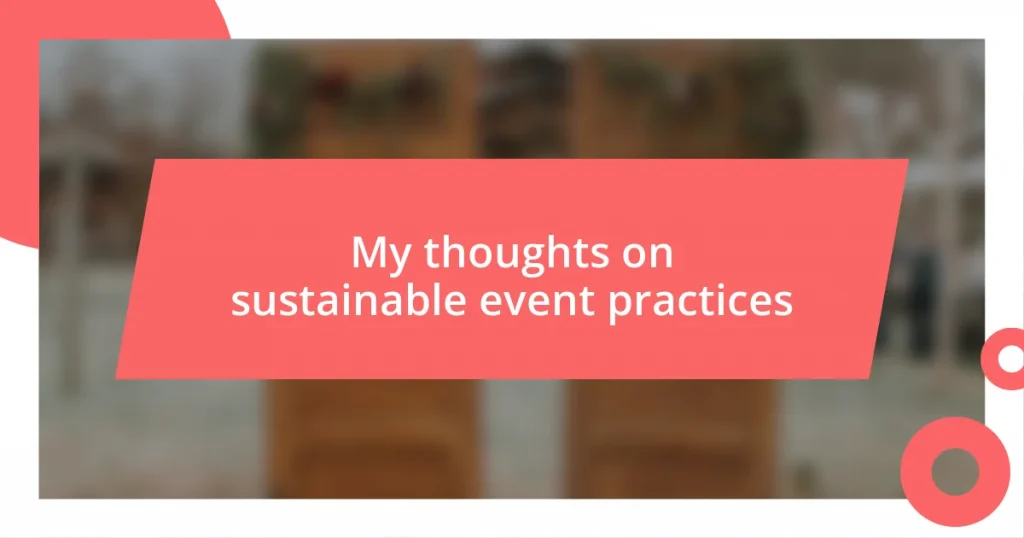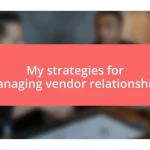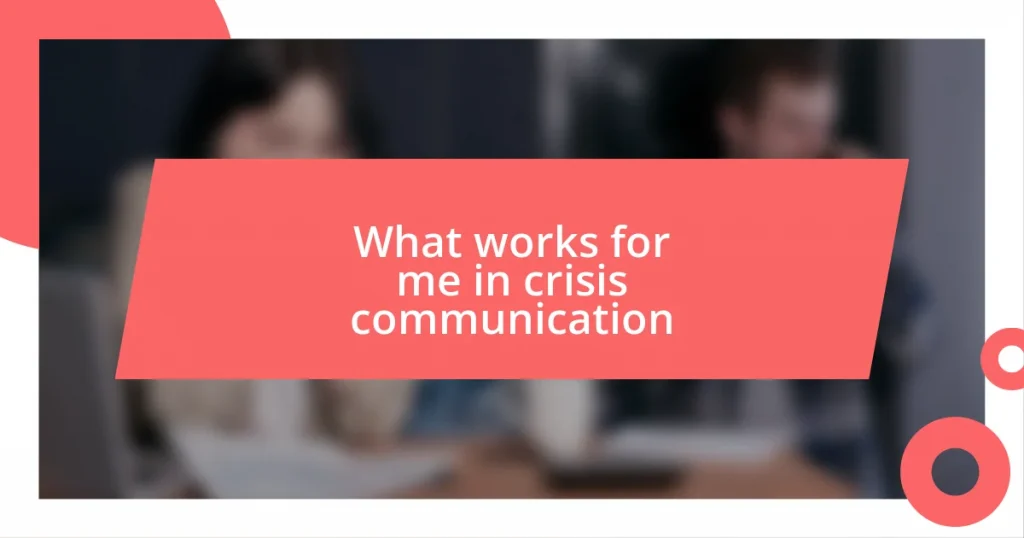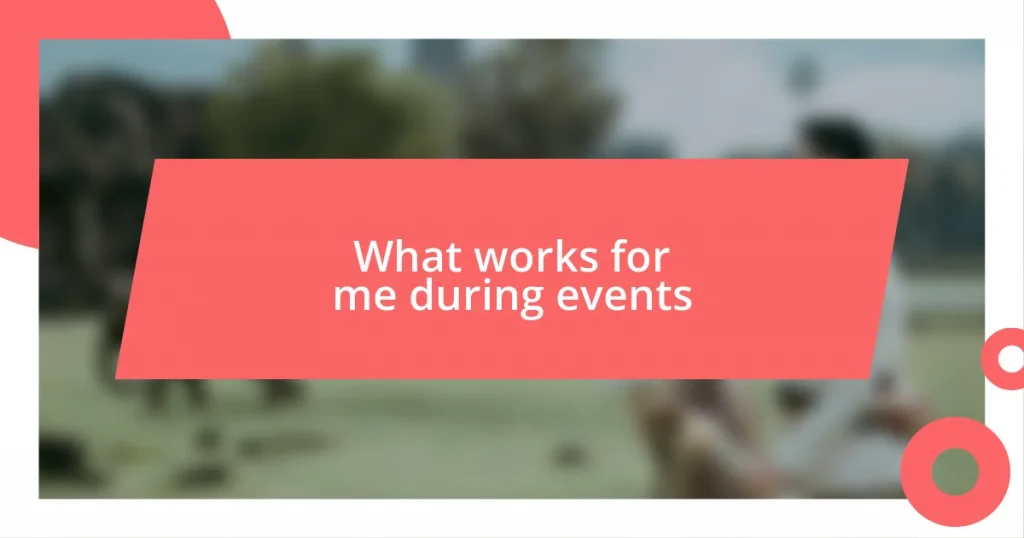Key takeaways:
- Sustainable event practices focus on minimizing environmental impact through initiatives like community engagement, use of renewable energy, and effective waste management.
- Benefits of sustainable events include enhanced attendee satisfaction, long-term cost savings, and improved brand reputation, fostering loyalty among environmentally conscious customers.
- Engaging attendees through interactive experiences and storytelling can deepen their commitment to sustainability and create a supportive community around eco-friendly practices.
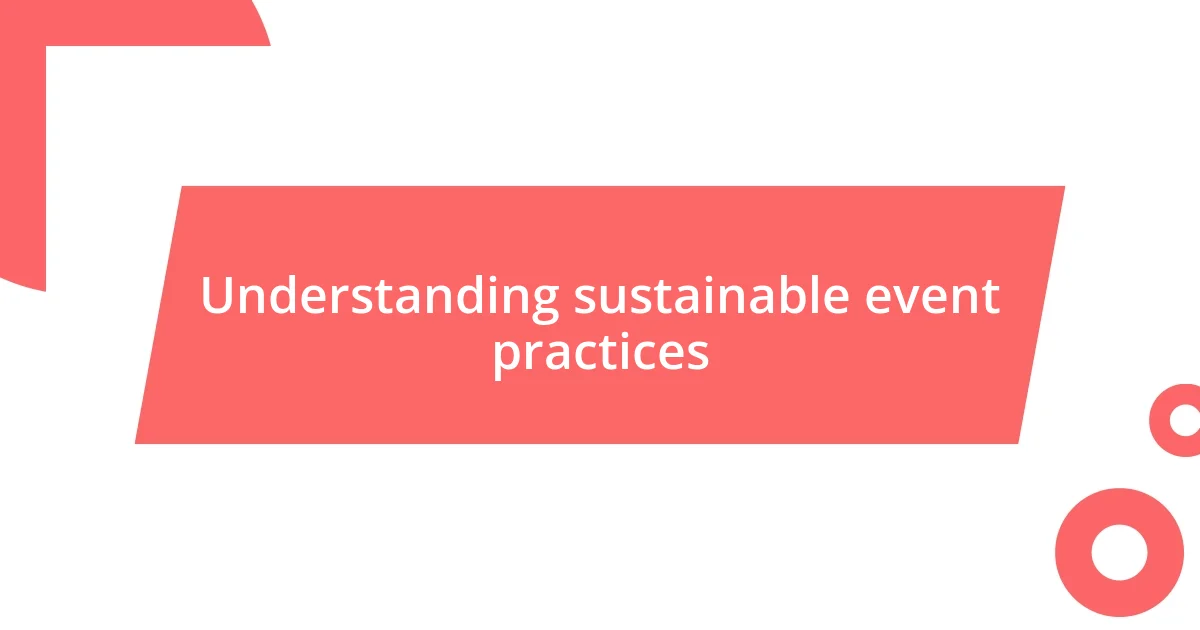
Understanding sustainable event practices
Sustainable event practices revolve around minimizing the environmental impact of gatherings, which is something I’ve become increasingly passionate about. For instance, my first experience organizing a sustainable event opened my eyes to how small changes—like using digital tickets instead of paper—can significantly reduce waste. Did you know that just by encouraging recycling and composting, events can divert over 70% of their waste from landfills?
One key aspect I think many overlook is community engagement. When I coordinated a local festival, we collaborated with local vendors instead of sourcing everything from afar. This not only enhanced the event’s authenticity but also supported the local economy. Isn’t it rewarding to see your community thrive together? Sustainable practices can foster these connections while being environmentally responsible.
It’s also essential to consider the energy usage during events. Reflecting on an eco-friendly conference I attended, the organizers prioritized renewable energy sources, which not only lowered their carbon footprint but also inspired other attendees to adopt similar practices. What does it say about us when we choose sustainability not just for the environment but for the legacy we leave behind? The impact of our choices can resonate long after the last guest leaves.
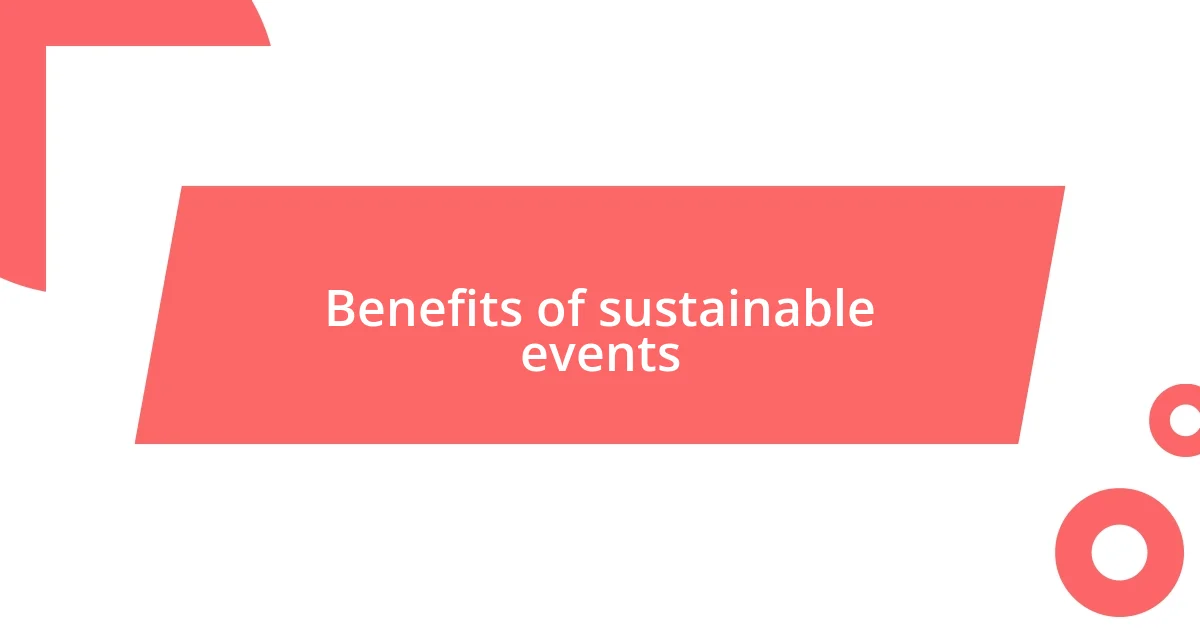
Benefits of sustainable events
Sustainable events create a ripple effect of benefits that extend far beyond the immediate experience. From my experience, when organizers prioritize eco-friendly practices, they often see a surge in attendee satisfaction. For instance, at a green festival I attended, guests loved the interactive workshops on sustainability, deepening their connection not just to the event but also to the cause. It’s fascinating to feel the collective energy and enthusiasm when everyone unites for a shared purpose.
Another significant advantage is the cost savings in the long run. I recall managing a charity event focused on sustainability, and by utilizing reusable materials, we dramatically cut down on expenses for supplies. Plus, the funds we saved were redirected to the charity, amplifying our impact. Isn’t it profound how sustainability can bolster a noble cause while also being economically sensible?
Furthermore, sustainable events enhance brand reputation. I’ve witnessed companies that adopt eco-friendly strategies earn loyalty from customers who value environmental responsibility. When attendees see a commitment to sustainability, it cultivates trust and inspires them to support those brands in the future. Isn’t it uplifting to know that our choices can influence others to think and act sustainably?
| Benefit | Description |
|---|---|
| Enhanced Attendee Satisfaction | Guests engage deeply with eco-friendly practices, leading to a fulfilling event experience. |
| Cost Savings | Utilizing reusable materials can significantly decrease expenses, allowing funds to support core initiatives. |
| Improved Brand Reputation | By demonstrating commitment to sustainability, brands can earn customer loyalty and trust. |
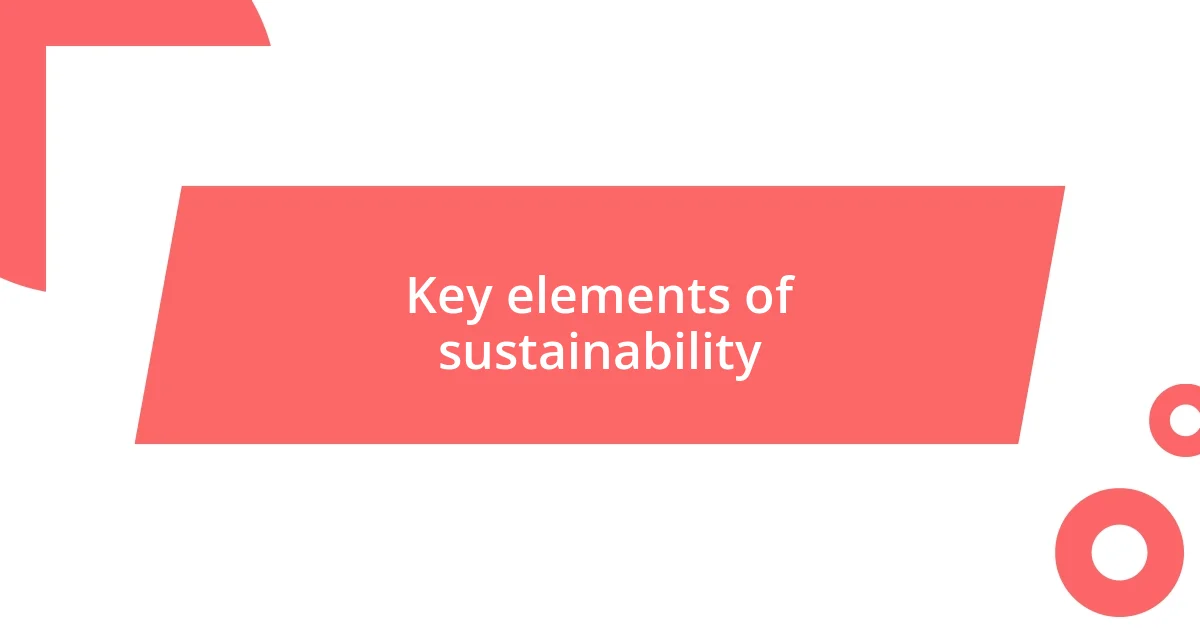
Key elements of sustainability
Sustainability in event planning hinges on several key elements that intertwine to create an eco-friendly experience. From my viewpoint, incorporating sustainable materials is crucial. I once attended an art fair that showcased local artisans exclusively using recycled materials. The creativity on display felt genuinely inspiring, proving that sustainability doesn’t mean sacrificing aesthetics or quality. It’s these choices that can transform an event from ordinary to extraordinary, reflecting both cultural values and environmental awareness.
Here are the essential elements of sustainability for events:
- Use of Sustainable Materials: Opting for products made from recycled or biodegradable sources reduces waste.
- Energy Efficiency: Utilizing energy-efficient lighting and renewable energy sources can significantly lower carbon footprints.
- Waste Management: Implementing robust recycling and composting programs helps divert waste from landfills.
- Local Sourcing: Supporting local vendors not only reduces transportation emissions but also enriches the community.
- Transportation Choices: Encouraging attendees to use public transport or carpool can minimize the overall environmental impact.
Every time I see an event that embraces these principles, I can’t help but feel a sense of hope. It’s evident that our collective choices pave the way for future gatherings that honor both people and the planet.
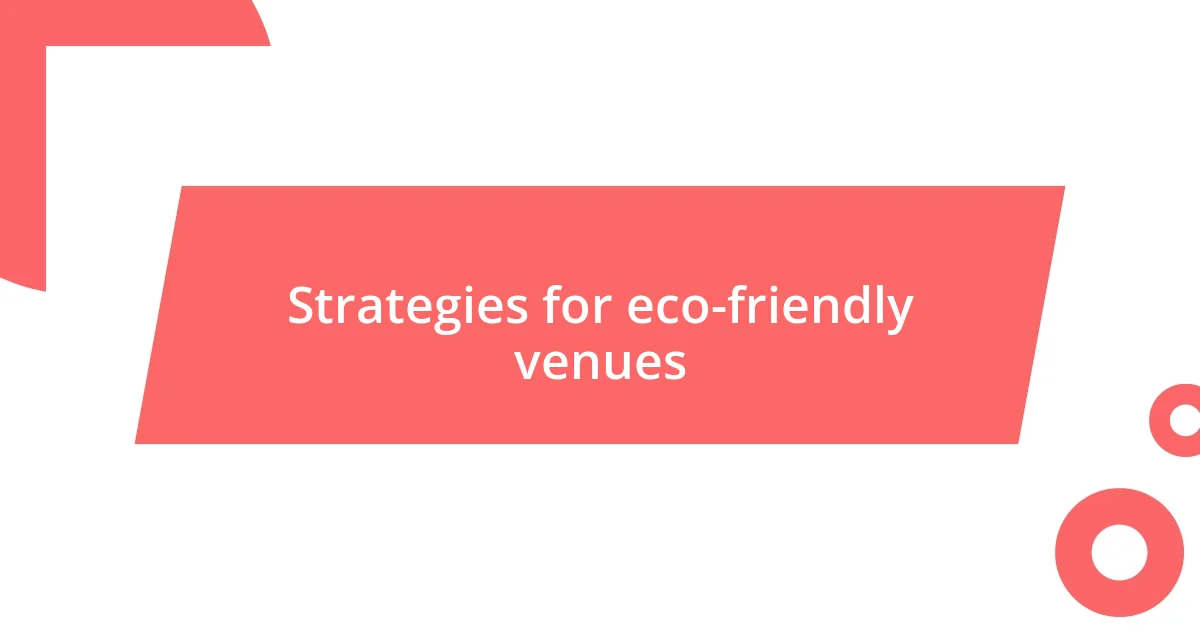
Strategies for eco-friendly venues
One effective strategy for promoting eco-friendliness at venues is prioritizing energy efficiency. I remember attending a conference held at a venue that utilized solar panels for its energy needs. The organizers proudly shared how this not only lessened their carbon footprint but also reduced their electricity costs. Have you ever tried switching off the lights in your own home only to recognize how much brighter it feels when you open a window instead? It’s a simple yet impactful reminder of the power of natural resources.
Another essential approach is to source food and supplies locally. At an outdoor market event I participated in, all the catering was provided by nearby farms. This decision not only brought delicious, fresh flavors to the table but also created a strong bond with local businesses. It made me think about how supporting our community can be as rewarding as enjoying a meal; after all, isn’t it fulfilling to feel part of something larger?
Lastly, effective waste management systems can make a significant difference in reducing a venue’s ecological impact. During a music festival I attended, they set up multiple clearly labeled recycling and composting stations throughout the site. I was pleasantly surprised to see attendees enthusiastically participating in the program, showcasing how people do want to engage in sustainability when given the opportunity. Can we foster that kind of excitement at every event? I believe we can, and witnessing this kind of community action gives me hope for future gatherings.
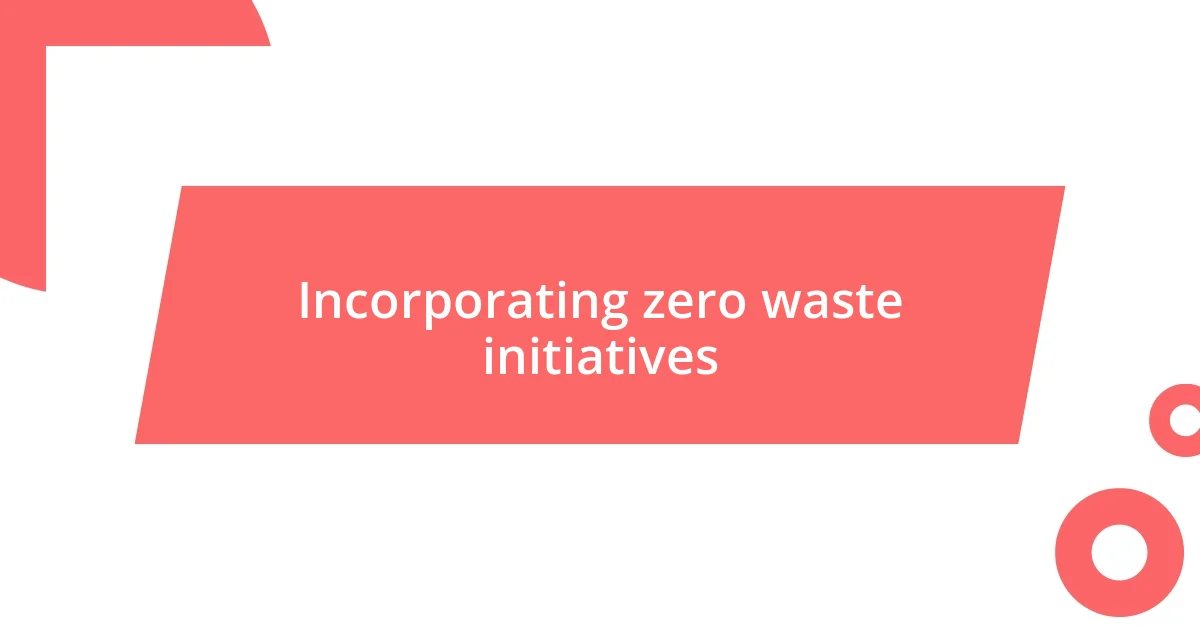
Incorporating zero waste initiatives
One of my most memorable experiences was at a zero waste festival where every detail had been thoughtfully planned to minimize waste. Compostable utensils, reusable plates, and extensive recycling stations made it seamless for attendees to participate. Watching everyone enjoy their meals without the usual clutter of wrappers and plastic was refreshing. Have you ever felt that sense of liberation when you know you’re doing the right thing for the planet? It’s exhilarating and makes the experience more enjoyable.
Implementing a robust waste tracking system can revolutionize how events manage their refuse. At a local charity gala I attended, organizers collected data on the waste produced throughout the night. They followed up with a report that not only highlighted the amount of waste saved from landfills but also provided actionable insights for future events. Wouldn’t it be amazing if more organizers embraced this transparency? Not only does it encourage accountability, but it also inspires others to think critically about their waste.
One thing that struck me was the stellar engagement from attendees when they realized their role in the zero waste initiative. At a recent outdoor concert, the team handed out cloth bags to encourage people to collect recyclables during the event. I watched as friends turned it into a fun little challenge, competing to see who could collect the most. It felt less like a chore and more like a communal effort—proof that when you create a supportive environment, sustainability can become part of the event’s narrative rather than an afterthought. Who wouldn’t want to be part of something that feels so empowering?
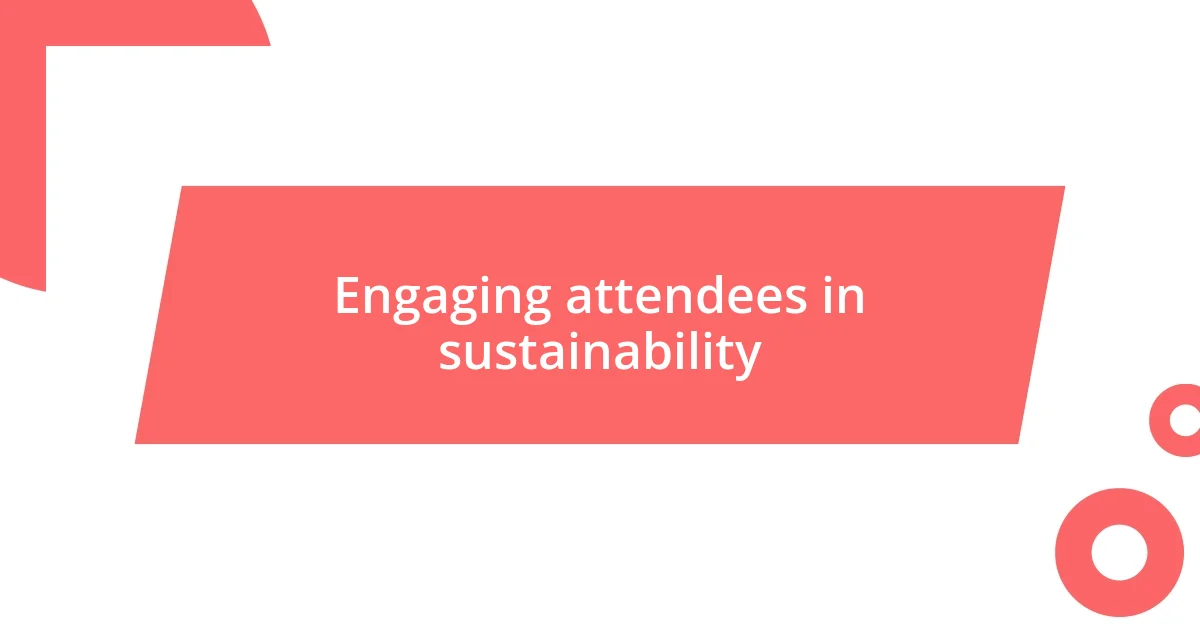
Engaging attendees in sustainability
Engaging attendees in sustainability isn’t just about providing information; it’s about creating an experience that resonates with them. I once attended a workshop where participants were encouraged to share their sustainability challenges and successes. As stories unfolded, I realized the profound connection we all have to environmental efforts. Have you ever felt that rush of camaraderie when discussing a shared passion? It’s a powerful motivator that inspires attendees to take action, fostering a community built on mutual support.
Interactive activities can amplify that sense of engagement. I remember a recent eco-themed event where they set up a “green pledge wall.” Attendees wrote down their commitments to sustainable practices and pinned them up for everyone to see. The wall quickly became a focal point, sparking conversations and encouraging others to think about their own impact. Isn’t it fascinating how visual representations of our goals can inspire us to take them more seriously? It transformed personal intentions into a collective movement.
Setting a positive tone also matters greatly. At a particular gala I attended, the event organizers infused sustainability messaging into the entertainment. Artists performed pieces highlighting environmental themes, which not only captivated the audience but also made them reflect on pressing issues. I could see people visibly moved, discussing the performances and their implications during intermissions. Have you ever been inspired by art to change your point of view? It reminds us that sustainability doesn’t have to be boring; it can be vibrant and engaging, sparking real conversations and commitments.
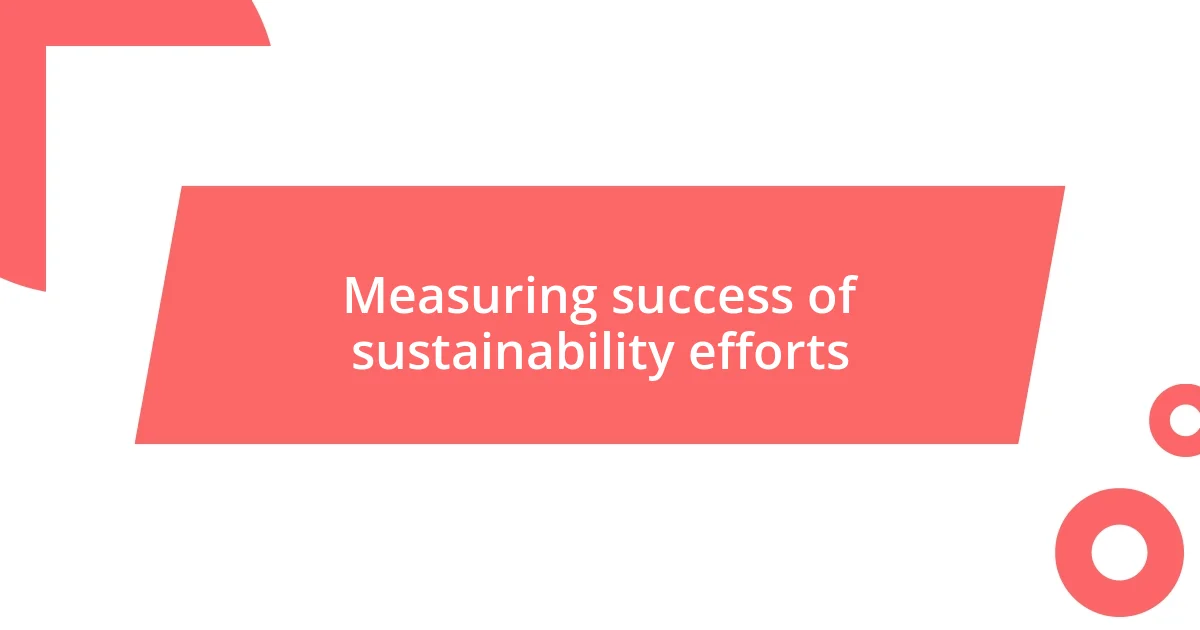
Measuring success of sustainability efforts
Measuring the success of sustainability efforts at events is a nuanced task that goes beyond just numbers. After attending a green conference, I learned how one organizer analyzed attendee feedback alongside waste statistics to paint a fuller picture of their impact. It struck me that understanding perceptions, not just physical waste reduction, is key to making genuine progress. Isn’t it incredible how qualitative and quantitative data can intertwine to tell a more compelling story?
Another noteworthy approach involves setting specific, achievable goals before the event takes place. I once volunteered at an eco-friendly fair where the organizers aimed to reduce energy consumption by 30%. They not only tracked power usage during the event but also encouraged other vendors to share their energy-saving measures. The sense of shared responsibility was palpable. It prompts me to wonder: how can we allure more event planners to establish such clear benchmarks for their sustainability targets?
Ultimately, the power of storytelling plays a significant role in showcasing success. At a community festival, the organizers created a captivating video montage detailing their sustainability journey, highlighting both challenges and triumphs. As attendees watched, it sparked a sense of pride and connected us all to their mission. Isn’t it fascinating how personal narratives can inspire others to adopt sustainable practices? Measuring success is not just about the data itself, but also about sharing our journeys in a way that resonates deeply with everyone involved.



